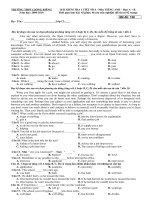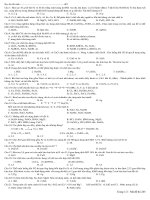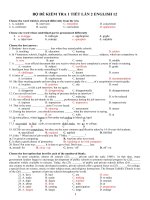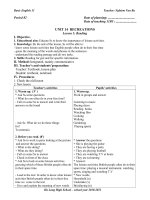de kiem tra 1 tiet lan 2 lop 11
Bạn đang xem bản rút gọn của tài liệu. Xem và tải ngay bản đầy đủ của tài liệu tại đây (160.04 KB, 15 trang )
<span class='text_page_counter'>(1)</span>SỞ GD & ĐT BẮC GIANG. ĐỀ KIỂM TRA LẦN 2. TRƯỜNG TH, THCS, THPT. MÔN TIẾNG ANH. NGUYỄN BỈNH KHIÊM. LỚP 11. Full name: ……………………………………………………………….. Class 11a…… Pick out the word whose underlined part is pronounced differently from that of the others 1- A. decided. B. visited. C. wanted. D. handicapped. 2- A. corn. B. cup. C. can. D. city. 3- A. minority. B. literacy. C. primary. D. library. 4- A. whom. B. who. C. whose. D. whale. Listen and choose the best answer. 5.Lan and Ha have been friends for………………… A long time.. B. a few years C. a day. D. a week.. 6. Ha,s family moved to Hai Phong in……………… A. 1895. B. 1985. C. 1986. D. 1987.. 7. Lan was going on a two-day trip to Do Son…………. A. last week. B. last month. C. last year d. last night. 8. Lan gave Ha a ring and she so …………. A. happy. B. unhappy. C. unfriendly. D. friendly. Choose the underlined part among A, B, C or D that needs correcting 9. Peter apologized for break the vase. A. B. C. D. 10. David asked me telling him the time. A. B. C D. 11. Paul thanked me on writing him to dinner. A. B. C. D. 12. I warned them not climb the mountain in such bad weather. A. B. C. D. 13. I was in a hurry because I didn’t want being late for school A. B. C. D.
<span class='text_page_counter'>(2)</span> 14. Her parents prevented her from get married to her teacher. A. B. C. D. Choose the best answer for each of the following sentences: 15……………………are children whose parents passed away. A. Volunteers B. College students C. Handicapped children. D. Orphans. 16. How many ……………are there in the competition? A. participates. B. participants. C. participations. D. participative. 17. Someone told us…………..sit on the stairs. A-don’t. B-met/was working. C. not to. D. to not. 18. Her mother prevented her…………..going out that night. A-against. B-from. C-about. D-at. 19.I apologised…………..the book at home.. A-for leaving. B-to leaving. C-leaving. D-to leave. 20. Tom insisted............paying the bill. A. of. B. in. C. on. D. for. 21. I don't mind............late if it will help at all. A. working. B. to be work. C. work. D. to work. 22. "Let's go to the cinema" He suggested........... to the cinema. A. gone. B. to go. C. go. D. going. 23. " I made a mistake in the calculations" She........... making a mistake in the calculations. A. promised. B. admitted. C. apologized. D. agreed. 24. Jack congratulated me....................passing the examination. A. on. B. above. C. from. D. in. 25. John and his wife were thinking.................. widening their farm. A. to. B. of. C. with. D. on. 26. The aim of the English Competition was to…….the spirit of learning English among students. A. stimulate. B. organize. C. present. D. participate. 27. I warned her............seeing him. A. from. B. against. C. to. D. at. 28. My mother always helps me………..English A .learns. B .to learn. C . learning. D . learnt.
<span class='text_page_counter'>(3)</span> Change the sentences into the reported speech. 29.“ Whatever you do, don’t walk on the grass” the safeguard said to the tourists. -> The safeguard warned………………………………………………………………………. 30.“ I haven’t done anything wrong,” Tom said. -> Tom denied…………………………………………………………………….. 31.“ No, I won’t talk to the lawyer,” Thu said. => Thu refused………………………………………………………………………… 32.“ Yes, I did drive too fast through the town,” she said =>She admitted………………………………………………………………………………… 33.”Don’t forget to join in the contest tomorrow morning” Dong said .=> Dong reminded………………………………………………………………………… Read the passage and choose one correct answer for each question. Spring School is an informal school. It provides classes to disadvantaged children in Ho Chi Minh city. Around 30 street children live and study at the school and about 250 children with special difficulties from District 1 regularly attend classes. The Organisation for Educational Development co-operated with Spring School to set up English classes in 1998. Dance, theatre, singing and folk music classes were set up a year later. Children from these classes participate in fundraising performances. They raise money to continue their English and performance Arts classes. Spring School requires volunteers to help organize their fundraising dinner held annually in June. This is an exciting night in which children dance, sing and play music at one of the largest hotels in Ho Chi Minh City. They also need foreign volunteers to contact sponsors and help to expand the school activities. Volunteers are required from February until July to help organize these events. It is hope that more schools like Spring School will soon be found in other cities in Vietnam. 34. What kind of Spring school? A. a primary school. B. a formal school. C. an informal school. D. a secondary school. 35. When were dance, theatre, singing and folk music classes set up? A. In 1997. B. In 2000. C. In 1998. D. In 1999. 36. Why do children take part in fund- raising performances? A. Because they want to expand the school. B. Because they want to contact sponsors. C. Because they need money to continue their English and Arts classes. D. Because they like dancing. 37. Where do children dance, sing and play music?.
<span class='text_page_counter'>(4)</span> A. At their School.. B. At one of the largest hotels in Ho Chi Minh City.. C. In Ha Noi.. D. In the theatres.. 38. What is the aim of Spring School? A. It provides classes to volunteers in Ho Chi Minh City. B. It provides classes to disadvantaged children in Ho Chi Minh City. C. The aim of this school is fundraising. D. The aim of this school is to raise fund. Choose the best answer: 39. "No, it's not true. I didn't cheat in the exam" A. Tom denied cheating in the exam.. B. Tom denied not to cheat in the exam.. C. Tom denied didn’t cheat in the exam.. D. Tom denied to cheat in the exam.. 40. "You took my pencil,"said David to Henry. A. David accused Henry of taking his pencil. B. David advised Henry to take his pencil. C. David accused Henry on taking his pencil D. David accused Henry of take his pencil 41. "I'm sorry, I didn't phone you" A. Karen promised not to phone me.. B. Karen admitted for not phoning me.. C. Karen apologized for not phoning me.. D. Karen refused to phone me.. 42. “”You are too yuong to get married”. Lan’s parents said to her. A. Lan’s parents said that she can’t get married at quite a young age. B. Lan’s parents stopped her from getting married. C. Lan’s parents said that she is so young that she can’t get married. D. Lan’s parents advised her not to get married. 43. Jane said, “You stole my best book, Tom”. A. Jane said that Tom was her thief. B. Jane insisted Tom on stealing her best book. C. Jane accused Tom of stealing her best book. D. Jane wanted Tom to give her best book back to her.. THE END.
<span class='text_page_counter'>(5)</span> SỞ GD & ĐT BẮC GIANG. ĐỀ KIỂM TRA LẦN 2. TRƯỜNG TH, THCS, THPT. MÔN TIẾNG ANH. NGUYỄN BỈNH KHIÊM. LỚP 11. THE KEY TEST No 2. 1.D 11.B 21.A. 2.D 12.B 22.D. 3.B 13.C 23.B. 4.D 14.B 24.A. 5.A 15.D 25.B. 6.B 16.B 26.A. 7.C 17.C 27.B. 8.D 18.B 28.B. 9.C 19.A. 10.B 29.C. 29.“ Whatever you do, don’t walk on the grass” the safeguard said to the tourists. -> The safeguard warned the tourists against not walking on the grass. 30.“ I haven’t done anything wrong,” Tom said. -> Tom denied doing anything wrong. 31.“ Let,s go shopping” Thu said. => Thu suggested going shopping. 32.“ Yes, I did drive too fast through the town,” she said =>She admitted driving too fast through the town. 33.”I don,t know anything about it” Dong said .=> Dong denied knowing about it. 34.C. 35.D. 36.C. 37.B. 38.B. 39.A. 40.A. 41.C. 42.B. 43.C.
<span class='text_page_counter'>(6)</span> THE MATRIX OF TEST No2 Topics. Knowledge. Comprehension. Application. Total. I / Phonetics : -The pronunciation of :- / d /- / t /-/id/. 1. / k /-//. 1. / i / - / ai /. 1. /w/-/h/ III. Listening:. 4. 1 2. 1. 1. 4. II .Vocabulary & grammar : * Vocabulary :. 2. 2. * Grammar : -multi-choice. 7. 5. 5. 17. - rewrite the reported speech :. 3. 2. 2. 2. 1. 5. 3. 2. 1. 6. 23. 12. 8. 43. 5. Reading: Reading comprehension. IV- Writing : -. Identifying error :. TOTAL SENTENCES.
<span class='text_page_counter'>(7)</span> Ngày soạn: 20/10/2016 Ngày dạy: …./10/2016 Period:34. TEST YOURSELF B. I. Objectives: 1. Educational aim: - According to the TEST students can revise all the language skills and grammatical points which they have studied and used in the three units: 4, 5 and 6. - Students can improve their techniques of doing the simple tests. 2. Knowledge: After this lesson, students will be able to: - Check themselves their skills in reading, speaking, listening, writing - Improve their knowledge through the test yourself - Language: Students can improve their techniques of doing the simple tests 3. Skill: After this lesson, students will be able to: - Check themselves their skills in reading, speaking, listening, writing - Improve their knowledge through the test yourself II. Method: Integrated, mainly communicative III. Teaching aids: Textbook, board, hand-outs, cassette tape and player. IV. Procedures:. Teacher’s activities. Students’ activities. Warm-up: (5 minutes) - Greeting. - Greeting. - Ask students something about the test yourself B. - Answer teacher’s questions. * Have you prepared it at home? * Have you got any difficulties? I. Listening(2.5 points) (10 minutes) - Ask students to read all the sentences first - Ask students to listen to the tape once. - Ask students to listen again and speak out the statements are true or false . - Ask students to listen in the third time, the work in groups to compare and discuss the. - Look at the book and listen to the task - understand the task - Read the questions - Listen to the tape.
<span class='text_page_counter'>(8)</span> answers with each others to find the correct answers.. - Listen again and say the statements are true or false. - Listen and discuss in groups to find the correct answers:. II. Reading (2.5 points) (10 minutes) - Presents the task:. Keys:1A, 2B, 3D, 4C, 5B.. - Asks pupils to work in groups to compare the answers they have already done to find the correct ones.. - Look at the textbook and listen to the teacher. - Gives the correct answers to the class:. - Work in groups to discuss about the passage - Finish the task - Compare their results with the other groups, and then with the keys - Write the answers on the board - Listen to the teacher and correct the answers. III. Grammar(2.5 points) (8 minutes) - Presents the task: a/ Ask students to listen and put a tick in the right box. b/ Let students finish each of of the following sentences in such a way that it has the same meaning as the original sentence.. - Listen to the teacher - Work in groups - Compare the results with the other groups - Show the answers in front of the class. - Keys: 1D, 2B, 3B, 4C, 5C - Observe the keys and correct their answers. - Keys:. IV. Writing (7 minutes). a. 1. play, 2. drive, 3. twice, 4. proud. - Presents the task: - Calls the students to read the suggested sentences in front of the class.. -. Checks their writings and help them correct the mistakes if they’ve made.. - Keys: b. 1. taking, 2. to go, 3. smoking, do, 6. going, 7. to make.. - Students work in groups and practise writing. - Two students go to the board and write. - Give the writings by reading aloud. - Read the writing carefully. - In groups or in pairs. - Compare the results with the other groups - Correct mistakes. 4. saying, 5..
<span class='text_page_counter'>(9)</span> Sample writing “ Road to Mount Olympia” is a very popular competition for secondary students in Vietnam. It is a general knowledge quiz, which debuted on VTV3 in 1999 and since then has been shown at 10:30 a.m every Sunday on the same channel. The show is sponsored by LG Corp and hosted by several popular speakers such as Ta Bich Loan, Luu Minh Vu, and Tung Chi The copetition last one year and consists of 52 qualifying sessions and a final. There are 4 competitors in each session. These are the representatives of different schools around the country. They are asked questions about sciences and arts. The winner of each weekly session can go to monthly session and compete with other students to win a place at the quarterly session. The winners a of the quarterly session can go to the final. The winner of the final will receive a large cash prize. I like the show very much because I can learn a lot from the questions asked in it.. - Study all the lessons again Homework (5 minutes) - Ask students: + to study all the lessons again + to get ready for the 45 minute-test in the next period. V. EXPERIENCE:. - Get the knowledge ready for the coming test.
<span class='text_page_counter'>(10)</span> Ngày soạn : 20/10/2016 Ngày dạy: …../10/2016. Period: 36. TEST No 2. I. Objectives: 1. Educational aim: -Give the TEST students can revise all the language skills and grammatical points which they have studied and used in the three units: 4, and 6. 2. Knowledge: After this lesson, students will be able to: - Check themselves their skills in reading, speaking, listening, writing - Improve their knowledge through the test. - Language: Students can improve their techniques of doing the reported speech with gerund. 3. Skill: After this lesson, students will be able to: - Check themselves their skills in reading, speaking, listening, writing - know the way to revise by themselves. II. Method: Integrated, mainly communicative III. Teaching aids: Test, lap-top. IV. Procedures:. Teacher’s activities. Students’ activities.
<span class='text_page_counter'>(11)</span> Warm-up: (1 minutes) - Greeting. - Greeting. I. Listening (10 minutes). - listen to. - Ask students to read all the sentences first. - understand the task. - Ask students to listen to the tape once.. - Listen to the tape. - Ask students to listen again and do the test .. - Listen again and choose the best one.. - Ask students to listen in the third time, and choose the best answers.. - Read the request and choose the best one. II. Reading (15 minutes) - the task: choose the best answer.. - Students work individually. III. Grammar (15 minutes) - Ask students to read and choose the best one. - Let students finish each of of the following sentences in such a way that it has the same meaning as the original sentence.. IV. Writing (7 minutes) - Presents the task: -Ask the students to do the test .. .. - Study all the questions again - Get the knowledge ready for the coming test.
<span class='text_page_counter'>(12)</span> Ngày soạn : 20/10/2016 Ngày dạy: …../10/2016 Period: 35. REVISE. I.Objective: 1. Knowledge: To revise Unit 4- 6. 2. Skill: By the end of the leson ss will be able to review the grammar, structure, pronunciation. 3. Students, understanding: to revise 2 units. II. Procedure: Teacher,s activities 1. Greeting: Ask qs to warm-up. 2. Checking the old lesson:. Students, activities Greeting Answer the qs..
<span class='text_page_counter'>(13)</span> Ask sth to check the old lesson. 3. New lesson: 1.Reported speech with gerund Form: V+(O)+Preposition+(not)+ V-ing Use: We usually use a gerund structure to report thanking, apologies, accusations, and so on. Accuse(sb) of, apologise (sb)for, insist on(kh¨ng kh¨ng), congratulated (sb) on, dream of, warn(sb) against (dặn ai để phßng c¸I g×/ai), prevent (sb)from, thank(sb) for, suspect(sb) of…. Note: we don’t use'say” in this structure. - Some verbs do not need a preposition: Stop, admit, suggest, deny, mention, propose(đề nghi) 2. Gerund: A gerund is the Verb – ing form. Ex: 1. There’s no point in waiting. 2. I don’t mind cooking the meals. 3. Reading French is easier than speaking it. - The gerund can be used in the following ways: as subject of a sentence: Skiing can be dangerous. as complement of a verb: Her hobby is painting. after prepositions: He was accused of smuggling. After certain verbs (eg. admit, avoid, deny, dislike, enjoy, excuse + object, forgive + object, fancy/imagine, finish, keep, mind, ect.) In noun compounds: My school has a swimming pool. 3.Present participle: Form: Verb – ing Ex: 1. Can you smell something burning? 2. We had to leave the tree lying there. 3. He spent a fortune rebuilding that old house. Use: We can use the present participle to form the continuous tenses:. Listen and take notes Whole class take note and give examples Ex: “Sorry, I’m late” She apologized for being late Ex:” I didn’t do that” She denied doing that “It was nice of you to help me. Thank you very much” Tom thanked me for helping him “Shall we pick you up at school?” They suggested picking me up at school -. To revise it. -. Listen to the teacher and bear in mind, copy down. -. Copy down. Asks students review and bear in mind Give the example Revise Present participle find, catch, leave + object (person or thing) I found them verbs of sensation (see, hear, feel and smell) and after listen to, notice and watch,.
<span class='text_page_counter'>(14)</span> I’m working right now. we can use object + participle as an adjective: The play was boring. after a certain verbs: After the basic verbs of sensation (see, hear, feel and smell) and after listen to, notice and watch, we can use object + participle: 1. I heard the car stopping and saw him getting out. 2. We watched the children playing. 3. I saw him crossing the road. find, catch, leave + object (person or thing) 1. I found them picking apples. (They were picking apples when I arrived.) 2. I caught them stealing my apples. (They were stealing my apples when I arrived.) 3. I left them talking. (They were talking when I left.) go and come With these verbs we can use the participles of verbs of physical activity: dancing, riding, sailing, skiing, etc., also shopping. Ex: Come dancing with me on Saturday. I’m going shopping. spend and waste + object I wasted a lot of time standing in queues. be busy She’s always busy cooking or cleaning. 4.Perfect gerund and perfect participle: having + past participle Ex: a. I kept you waiting so long. I am sorry. I am sorry for having kept you waiting so long. b. After Jack had read the letter twice, he wrote a reply. After having read the letter twice, Jack wrote a reply.. Revise by asking qs to ss. Perfect gerund and perfect participle: having + past participle. Homework: give the duty Do the duty.
<span class='text_page_counter'>(15)</span>
<span class='text_page_counter'>(16)</span>








